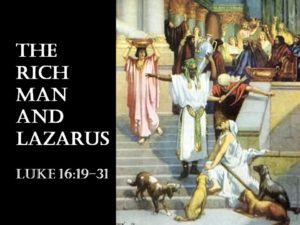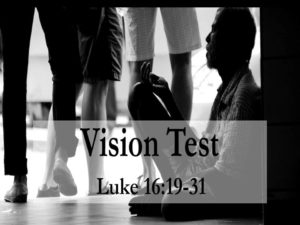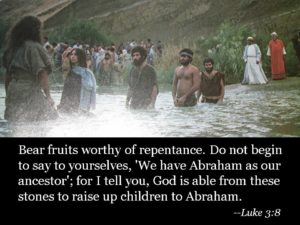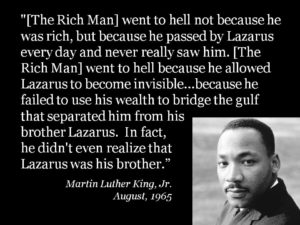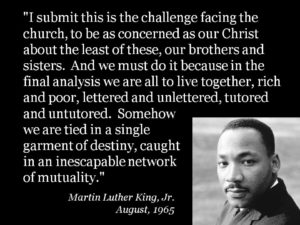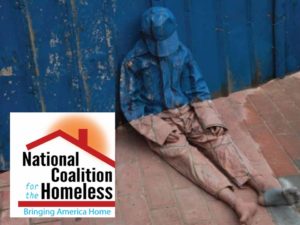This is a story in which Jesus calls us to confront the reality that every day we pass by people who are in desperate need—sometimes in obvious ways, but often in far deeper, less obvious ways too –and we walk right by:
Luke 16:19-31
[Jesus said:] There was a rich man who was dressed in purple and fine linen and who feasted sumptuously every day. And at his gate lay a poor man named Lazarus, covered with sores, who longed to satisfy his hunger with what fell from the rich man’s table; even the dogs would come and lick his sores. The poor man died and was carried away by the angels to be with Abraham. The rich man also died and was buried. In Hades, where he was being tormented, he looked up and saw Abraham far away with Lazarus by his side. He called out, ‘Father Abraham, have mercy on me, and send Lazarus to dip the tip of his finger in water and cool my tongue; for I am in agony in these flames.’ But Abraham said, ‘Child, remember that during your lifetime you received your good things, and Lazarus in like manner evil things; but now he is comforted here, and you are in agony. Besides all this, between you and us a great chasm has been fixed, so that those who might want to pass from here to you cannot do so, and no one can cross from there to us.’ He said, ‘Then, father, I beg you to send him to my father’s house—for I have five brothers—that he may warn them, so that they will not also come into this place of torment.’ Abraham replied, ‘They have Moses and the prophets; they should listen to them.’ He said, ‘No, father Abraham; but if someone goes to them from the dead, they will repent.’ He said to him, ‘If they do not listen to Moses and the prophets, neither will they be convinced even if someone rises from the dead.’
There is an old story about a botanist who was studying the heather bell found in the highlands of Scotland. While looking through his microscope at this beautiful flower, he was approached by a shepherd who asked what he was doing. Rather than trying to explain, the botanist invited the shepherd to peer through his microscope and observe for himself. When the shepherd saw the wonder of the flower, he exclaimed, “My God, and I have been tramping on them all my life!”
One thing that I have learned, and I know this is going to be hard for most of you to believe, is that I don’t know everything – that there are perspectives and ideas that I don’t fully appreciate – that there are times when my own ignorance can be an obstacle and a stumbling block to understanding the world around me.
And it can be a sinking feeling when I realize that I have really missed the boat on something. I think, if I had only known – I would have done something different.
But, too often, my not knowing – my ignorance occurs because of my own inattentiveness. I miss opportunities to learn and be present because my head was not up – my eyes were not open to those around me – to those people and places to which God is trying to direct my attention.
We might say – God, just give me a sign – and God wonders what kind of sign will it take to motivate me, to motivate you, to act – what is it that we are waiting for?
Today’s reading from Luke’s gospel – with its vivid characters – is ultimately a story about vision. It has a kind of Shakespearean quality to it – we might think of it as a three-act play. The first act portrays the earthly contrast between the wealthy man and Lazarus. The second act describes the reversal of their conditions in the afterlife. The third act depicts the rich man’s request to Father Abraham for a sign so that those still living can avoid his torment, a request that Abraham refuses.
First-century hearers of this parable would not have assumed that the rich man was evil and that the poor man was righteous. On the contrary, wealth in the ancient world was often viewed as a sign of divine favor, while poverty was viewed as evidence of sin.
So, the rich man’s sin was not that he was rich, but rather, that during his earthly life, he did not “see” Lazarus. Despite his daily presence at the entrance to his home, the first time he ever sees Lazarus is when, from Hades “he looked up and saw Abraham far away with Lazarus by his side”(Luke 16:23).
As for Lazarus, we aren’t told much, other than he is poor and hungry and only the dogs paid him any attention.
The rich man calls Abraham his “Father” – this is certainly a sign of respect – and a claim of a religious heritage. But for Luke – family bloodlines were much less important than living a life characterized by active compassion for others.
We hear this most profoundly in the story of John the Baptist, who tells the crowds, “Bear fruits worthy of repentance. Do not begin to say to yourselves, ‘We have Abraham as our ancestor’; for I tell you, God is able from these stones to raise up children to Abraham” (Luke 3:8). What is it that causes some people to have something or someone in their line of vision and yet not really see them?
Martin Luther King, Jr. speaks to this when he writes about this parable: “[The Rich Man] went to hell not because he was rich, but because he passed by Lazarus every day and never really saw him.” “[The Rich Man] went to hell because he allowed Lazarus to become invisible…because he failed to use his wealth to bridge the gulf that separated him from his brother Lazarus. In fact, he didn’t even realize that Lazarus was his brother.”
Dr. King would agree – that ultimately this parable is not principally a story about poverty, or about wealth, or even about the proper allocation of resources. This is a story about vision. This is a story in which Jesus calls us to confront the reality that every day we pass by people who are in desperate need—sometimes in obvious ways, but often in far deeper, less obvious ways too –and we walk right by.
This is about vision – our vision or lack there of.
On the high school mission trip to Washington DC this past summer – we learned about vision firsthand, and if you were here in August, you heard a story, from Stephanie Tan, when she shared about the night we heard speakers from the National Coalition for the Homeless.
Ultimately, we heard that at the end of the day, the worst thing about homelessness isn’t about not knowing when or from where your next meal or shower or warm bed will come – it isn’t about the fear of violence or illness or shame or stigma. The worst thing is the loss of your humanity – it is becoming invisible to the people around you – it is the reality that nobody takes the time to talk to you – to treat you as a human being.
It is about vision.
MLK concludes his comments on the parable, writing: “I submit this is the challenge facing the church, to be as concerned as our Christ about the least of these, our brothers and sisters. And we must do it because in the final analysis we are all to live together, rich and poor, lettered and
unlettered, tutored and untutored. Somehow we are tied in a single garment of destiny, caught in an inescapable network of mutuality.”
“And for some reason,” he continues, “I can never be what I ought to be until you are what you ought to be, and you can never be what you ought to be until I am what I ought to be. This is the way God made the world…we must all learn to live together as brothers [and sisters] or we will all perish as fools.”
I started this morning by saying that I don’t know everything and I don’t. I don’t always recognize the Lazarus in my midst or even recognize the pain or fear in the life of the Rich Man either. And for that reason, when I look out and see the anger and despair in the African-American community with so many killed – when cries of racism go up and black lives matter – I recognize that I don’t know everything and that I need to work to listen and try to understand the points of view from brothers and sisters who are in pain.
When I find myself in conversations where people wonder if they would be welcome in our church – welcome because of who they are –who they love – what they have done in their lives – and even when I tell them, all people are welcome here – they still look skeptical, because of past experience in churches – I again recognize that I don’t know everything and that I need to work to listen and to understand what it might look like to explicitly welcome all people into this community of faith and a relationship with God.
It is about vision and really seeing.
And it is also why it is so important that we host Family Promise – and walk in the Crop Walk with our neighbors – and build Health Kits – and open ourselves up to all of the different points of view and experiences that we can – so that our vision would be expanded and sharpened as we look out on this world and as we look one another in the eye.
This is how community is formed and strengthened – and community is where the abundant life that God promises is found – when we see those around us as gifts of God and experience the blessing of sharing what we have with others.
This is how we cross over that chasm that can lie between us – cross over that chasm to see and understand one another more fully and completely – to have our vision altered to see the world in all of its richness and complexity – and to see the person in front of us as a beloved, child of God. Let us pray. God of vision, clear our eyes. Challenge us to see, to really see one another. Strengthen our resolve to move beyond fear and hesitation to serve you and be your hands and heart in the world. In Jesus’ name. Amen.
Pastor John Berg

____________________________
Sources:
King Duncan, Collected Sermons, www.Sermons.com
John R. Donahue, The Gospel in Parables: Metaphor, Narrative and Theology in the Synoptic Gospels
(Philadelphia: Fortress Press, 1988).
Alyce M. McKenzie, The Parables for Today (Westminster John Knox Press, 2007).
“The Church at the Forefront of Racial Progress,” by Martin Luther King, Jr., preached at the Anderson
Auditorium, Montreat, NC, August 1965.
David Lose, “In the Meantime…”, Pentecost 19c: Eternal Life Now, September 16, 2016.

